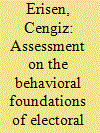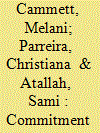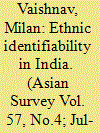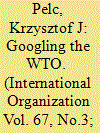| Srl | Item |
| 1 |
ID:
145641


|
|
|
|
|
| Summary/Abstract |
Turkish politics has overcome several challenges in order to reach a situation with less political uncertainty. Among several issues, voter behavior in the two recent general elections in 2015 is a major topic of interest. In this think-piece, I discuss the behavioral indicators of vote choice and political judgments between the two 2015 elections. To that end, I first explore the context of public polarization before introducing the behavioral approaches to explain voter behavior. I use nationally representative survey data in order to make descriptive inferences that shed light on the unexpected change in electoral behavior.
|
|
|
|
|
|
|
|
|
|
|
|
|
|
|
|
| 2 |
ID:
186810


|
|
|
|
|
| Summary/Abstract |
A core function of contemporary states is to ensure the security of their citizens. Yet in many post-conflict settings, non-state actors provide security alongside the state, typically prioritizing their own ascriptive groups and potentially undercutting a sense of national political community. When do citizens prefer group-specific versus national security? While most studies focus on individual psychological factors, we argue that group-level characteristics also shape political preferences. Based on a conjoint experiment in Lebanon, we explore the relative appeal of group-specific versus national pledges to assure protection. We find that respondents view national security provision quite positively, while members of communities with stronger group-specific security simultaneously favor private provision. Individuals with closer ties to credible group security providers are also more likely to prefer those services. Citizens therefore do not see a clear trade-off between private and public protection, while group-specific legacies mediate heterogeneity in support for pluralist security provision.
|
|
|
|
|
|
|
|
|
|
|
|
|
|
|
|
| 3 |
ID:
153688


|
|
|
|
|
| Summary/Abstract |
The ethnic politics literature assumes that one’s ethnic identity is readily identifiable. This paper evaluates how well this assumption holds in practice, drawing on a voter survey in the Indian state of Bihar. While voters often misidentify the identity of their candidate, the degree of error is small but systematic.
|
|
|
|
|
|
|
|
|
|
|
|
|
|
|
|
| 4 |
ID:
123020


|
|
|
|
|
| Publication |
2013.
|
| Summary/Abstract |
How does international law affect state behavior? Existing models addressing this issue rest on individual preferences and voter behavior, yet these assumptions are rarely questioned. Do citizens truly react to their governments being taken to court over purported violations? I propose a novel approach to test the premise behind models of international treaty-making, using web-search data. Such data are widely used in epidemiology; in this article I claim that they are also well suited to applications in political economy. Web searches provide a unique proxy for a fundamental political activity that we otherwise have little sense of: information seeking. Information seeking by constituents can be usefully examined as an instance of political mobilization. Applying web-search data to international trade disputes, I provide evidence for the belief that US citizens are concerned about their country being branded a violator of international law, even when they have no direct material stake in the case at hand. This article constitutes a first attempt at utilizing web-search data to test the building blocks of political economy theory.
|
|
|
|
|
|
|
|
|
|
|
|
|
|
|
|
| 5 |
ID:
190885


|
|
|
|
|
| Summary/Abstract |
What prolonged implications does conflict escalation have on voting behavior? The literature focuses primarily on the immediate effect of violent events on voting in nearby elections, leaving open questions about longer-term consequences. This article examines this question by studying Israel, where violent escalation in the Israeli–Palestinian conflict in the early 2000s was followed by an unexpected electoral outcome: the emergence and consolidation of a new centrist bloc that transformed a longstanding Left-Right partisan divide into a three-bloc system. Using two decades of survey data, it is argued that this shift is best explained by a long-term attitudinal change toward the conflict by many Israelis after the escalation. Rather than a strictly hawkish shift, many voters have become ‘Doubtful Doves’: supportive of territorial compromise in principle, but skeptical about reaching an agreement with the Palestinians in practice. This underdiscussed attitudinal structure, dovish but doubtful, has formed a new electoral base for centrist parties, breaking the traditional Left-Right dichotomy. These findings illustrate that violent periods in conflicts can cause non-trivial long-term changes in popular attitude structures and voting patterns, which, under the right conditions, can trigger electoral re-equilibration.
|
|
|
|
|
|
|
|
|
|
|
|
|
|
|
|